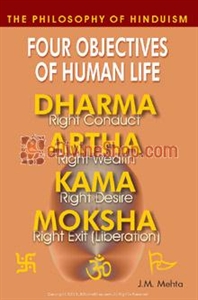1816- The four purusharthas or goals of human life

"The four purusharthas or goals of human life are
1. Dharma (righteousness, duty and moral order)
2. Artha (wealth and prosperity)
3. Kama (wordly desires) and
4. Moksha (liberation)
The ancient Hindus never neglected any aspect of human life. The four goals or endeavours of human life constitute the roadmap for a happy life on earth and beyond.
Let us try to understand each of the goals briefly:
1. Dharma is the foundation and first of the four human goals. Dharma refers to moral duties, obligations and conduct, namely, vidhis(do's) and nishedhs(dont's). Dharma is always given a highest importance, in Ramayana, Rama himself represented the Dharma and was crowned as a King. In Mahabharat, Krishna himself crowned the Dharma roopa Yudhishtir as King.
2. Artha, is the second goal of life for the householder for the attainment of wealth and material prosperity. The efforts or means to realising this goal must have a righteous and moral basis. It must be based on dharma or lawful means.
3. Kama, is the fulfillment of biological, physical and material desires. The householder is instructed by the shastras to legitimately fulfill his or her wordly desires in accordance with the canons of dharma. Artha & Kama are important goal for the growth and progress of society.
4. Moksha means
-liberation form the web of maya (only reality is Brahman/Divinity/ God and everything else is apparent reality or Maya),
-freedom from the cycles of birth and death, and
-the experiences of Divine happiness.
The goal of life is to reach back to that Reality i.e Brahman(Divinity) by realising our true nature. Divinity is equally present in all human beings, but not equally manifest in them. The purpose of spiritual practice is to manifest this inherent Divinity. When this Divinity becomes fully manifest, a person is said to have spiritually illumined or liberated; he is said to have attained 'moksha'. It is the reason Hindus pray 'asato ma sat gamaya' ('Lead me from the Unreal to the Real'), urging to give up the unreal, realise the real, and experience freedom from bondage to body, which is bliss.
Divinity is the true self of man. It forms very core of one's 'being'- Divine self which is infinite bliss. When he arrived at the perennial source of infinite bliss, all his wants and cravings disappear. He then experiences God - the all pervading Divinity, both within himself and without. He experiences Divinity/God as essence of everything and every being. He loves all. He transcends all suffering, fear, and sorrow. He sees himself as a part of a divine play where Divinity/God is playing all the roles, including his own. He can no longer identify with his body-mind-complex, which is subject to birth, change, decay and death. He gains the unshakable conviction that he is the eternal Divine spirit. Acquiring this knowledge he goes beyond both birth and death. He attains immortality. This is the ultimate goal of human life.
Compared to this intensely blissful experience every other joy derived from the senses is tasteless and insipid.
It is achieved through taking
(1)the refuge of God or
(2)the refuge of a God-realised guru.
Through the guru's grace one becomes free from the bondage or maya, and is blessed with self realisation and God-relalisation."
Labels: Life, Religion, Self development


0 Comments:
Post a Comment
<< Home